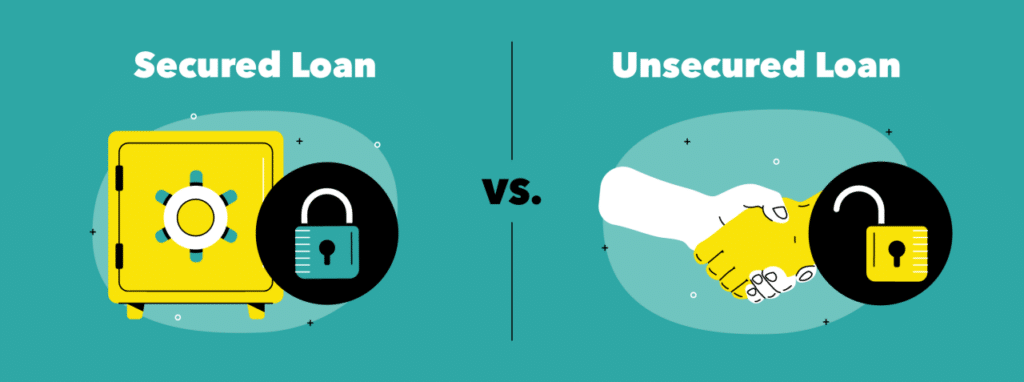Secured vs unsecured: what's best for you

When it comes to borrowing money, understanding the difference between secured and unsecured lending is crucial in making an informed decision. This key distinction can significantly impact the interest rates, borrowing limits, and repayment conditions you'll encounter.
Secured loans are backed by collateral, which can result in lower interest rates and higher borrowing limits due to the decreased risk for lenders. Unsecured loans, conversely, do not require collateral but often come with higher interest rates and stricter credit requirements.
This guide delves into the nuances of each loan type, helping you assess which option aligns best with your financial circumstances and goals.
Understanding Secured Loans
Secured loans are tied to an asset, such as a house or car. This asset acts as a safeguard for the lender, who can seize it if you default on the loan. The collateral's presence reduces the lender's risk, often leading to more favorable terms for the borrower, such as lower interest rates and the potential for larger loan amounts.
Common examples of secured loans include mortgages, auto loans, and secured personal loans. These loans are typically easier to obtain for those with less-than-perfect credit, given the protection the collateral offers to lenders.
However, the risk of losing your asset is a significant drawback. Therefore, it's important to consider your ability to repay the loan before securing it against a valuable asset.
Another advantage of secured loans is the potential for building credit. Consistent, on-time payments can positively impact your credit score, making future borrowing easier and potentially more affordable.
The Nature of Unsecured Loans
Unsecured loans don't require any collateral. Lenders issue these loans based primarily on your creditworthiness and promise to repay. Consequently, unsecured loans often have higher interest rates than their secured counterparts, reflecting the increased risk the lender takes on.
Examples include personal loans, credit cards, and student loans. These financial products can be more challenging to qualify for, especially for individuals with a low credit score or limited credit history.
The absence of collateral does not mean the lender has no recourse if you default. Lenders can take other collection actions, such as reporting the default to credit bureaus or suing for the amount owed, which can further damage your credit and financial standing.
On the flip side, for borrowers confident in their repayment ability, unsecured loans offer a way to borrow money without risking personal assets.
Evaluating Your Options
Choosing between secured and unsecured borrowing comes down to your specific needs and risk tolerance. Secured loans might be suitable if you're looking for lower interest rates and are comfortable using an asset as collateral. Unsecured loans could be better if you prefer not to risk assets or don't have suitable collateral but are willing to pay a premium in interest.
Consider your financial stability, the purpose of the loan, and your capacity to bear risk before deciding. It's also advisable to shop around and compare offers from multiple lenders to find the best terms.
A clear understanding of each loan's terms and conditions, including the interest rates, repayment period, monthly payment amount, and any additional fees, is crucial before committing to any borrowing agreement.
{FAQ}
{FAQ_ITEM}
{FAQ_TITULO}What are the main advantages of secured loans over unsecured loans?{/FAQ_TITULO}
{FAQ_CONTEUDO}Secured loans typically offer lower interest rates, higher borrowing limits, and longer repayment terms due to the collateral reducing the lender’s risk. This can make them more accessible to individuals with less-than-ideal credit scores.{/FAQ_CONTEUDO}
{/FAQ_ITEM}
{FAQ_ITEM}
{FAQ_TITULO}Is it easier to qualify for an unsecured loan?{/FAQ_TITULO}
{FAQ_CONTEUDO}No, unsecured loans often require a higher credit score compared to secured loans since they're not backed by collateral. Lenders take on more risk with unsecured loans, leading to stricter creditworthiness evaluations.{/FAQ_CONTEUDO}
{/FAQ_ITEM}
{FAQ_ITEM}
{FAQ_TITULO}Can defaulting on a secured loan affect my credit score?{/FAQ_TITULO}
{FAQ_CONTEUDO}Yes, defaulting on any loan, including a secured loan, can negatively impact your credit score. The lender may report the default to credit bureaus, besides taking possession of the collateral.{/FAQ_CONTEUDO}
{/FAQ_ITEM}
{/FAQ}
Making an Informed Decision: Secured vs Unsecured
Deciding between a secured or unsecured loan requires careful consideration of your financial situation, needs, and risk tolerance. Each option has its own set of advantages and drawbacks, reflecting the balance between risk for the lender and the borrower.
Ultimately, the best choice depends on your specific circumstances and financial goals. It's essential to analyze your ability to repay the loan, the importance of the interest rates, and the necessity of the borrowed funds for your situation.
Before making a decision, ensure to review multiple lending offers, understand all terms and conditions, and consider consulting with a financial advisor to guide you through the pros and cons of each option.
With the right approach, securing a loan—whether secured or unsecured—can be a beneficial step towards achieving your financial objectives.

Related